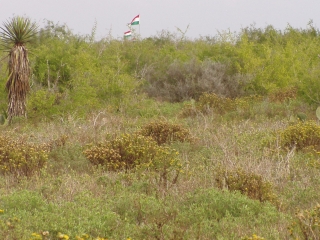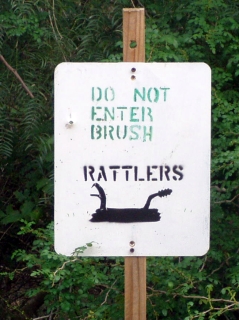Brownsville, Texas
NPS Website; Local Website

WHAT IS IT?
The only National Park Site dedicated to the Mexican-American War. This Site commemorates the war’s first battle, the April 25, 1846 clash that occurred just north of the Rio Grande, the disputed geographic border.
BEAUTY (4/10)
A tour of the Palo Alto Battlefield consists of a short paved trail through dense chaparral and south Texas prairie. Butterflies flit through the brush while birds chirp endlessly. A few flags denote the location of the army front lines. It is not a good idea to leave the path; western diamondback rattlesnakes are abundant. When you are not staring at you feet and the thick vegetation surrounding the path, look up.
The Battlefield is a stop (LTC 031 if you’re scoring at home) on the southern portion of the extraordinary Great Texas Coastal Birding Trail. We did not see many birds at the Site, but on the ride over we did spot local indigenous species like the Harris’s Hawk, Chihuahuan Raven and the Crested Caracara. South Texas is an unbelievable place for bird watching. Almost 500 species call the Rio Grande Valley home and at least 45 of these cannot be found in any other area of the United States.
As for terrestrial species, we kept our eyes open for the javelinas that inhabit the park but were both disappointed and relieved to see none. We would have been sure to not call it a pig.
HISTORICAL INTEREST (8/10)
The Park Service has given the Palo Alto Battlefield NHS a mandate to teach the Mexican-American War in its entirety. In that sense, the historical impact of the Site is tremendous. An international war began here. A war whose peace treaty ceded the lands that would become the American west: all of California, New Mexico, Arizona (except for the Gadsden Purchase), Texas, Utah, Nevada and parts of Colorado, Oklahoma and Nebraska.
Maybe we, as Americans, assume that either this land was always ours or that it was a part of the Louisiana Purchase. We often forget that this land was conquered and taken in battle. There are some reminders - the Marines Hymn speaks of fighting “From the Halls of Montezuma” and scattered place names bear the names Vera Cruz, Monterrey, Polk and Taylor – but nothing like the ornate anniversary celebrations surrounding Lewis and Clark.
Our manifest destiny was gained through blood and struggle, not just through land purchased by Thomas Jefferson. It is impossible to teach two years of war in one room with a dozen or so exhibits, but that is the challenge faced at this Site. Civil War museums, books, movies and National Park Sites exist and proliferate at alarming rates, so much so that history has relegated the Mexican-American War to “the one that the future Civil War generals cut their teeth in”.
The story of the Battle at Palo Alto is fascinating and complex. Because much of the country felt that a “free Texas” through military conquest was unjust and unconstitutional, President James K. Polk simply placed American troops along what our country felt was the American border, the Rio Grande. He knew that Mexico would react to what they saw as an act of aggression (their border was the Nueces River to the north). To them, American forces had already invaded.
Polk’s ploy worked. The Mexican soldiers crossed the Rio Grande and clashed with the superior artillery of the American forces. Many lives were lost and retreat was necessary. America responded to the Mexican invasion with outrage and Polk had his war for expansion. History proved Polk correct. Without the new territory, our country would be much smaller, much less prosperous and devoid of so many National Parks.
CROWDS (6/10)
There were a few retirees milling about the exhibits when we arrived. They did not affect our visit. A Ranger explained that visitation has picked up since the new Visitor Center opened in early 2004, but numbers never exceed more than 100 people per day.
Texas is a very big state. This Site is located at its southernmost point. In fact, Brownsville, Texas is the southernmost city in the United States. Even though the roads are good, it is a long trek to the Palo Alto Battlefield. San Antonio is 280 miles to the north and Houston is 350 miles to the northeast.
However, the beach resort and spring break mecca, South Padre Island, is only a 20-minute drive away. We found only retired winter Texans during our November visit, but were still able to get our feet wet in the warm Gulf Coast waters. Directions to the Battlefield are well marked; it is located on a major local road, FM 1847.
CONCESSIONS/BOOKSTORE (4/5)
The Site stocks an esoteric selection of books regarding James K. Polk, the Mexican-American War, 19th and 20th century border relations and local history. A lot of thought has gone into this highly representative collection. This rating falls short of perfect because the gift shop contains only books, the only exception being one generic magnet. We hope that as the Site grows, more mementos, postcards, T-shirts and even local crafts will be available.
COSTS (4/5)
Admission is free.
RANGER/GUIDE TO TOURIST RATIO (4/5)
Two of us, two Rangers.
TOURS/CLASSES (4/10)
Both the exhibits and the video are good introductions to the Mexican-American War. They, of course, have a strong emphasis on the Battle of Palo Alto. We learned much about the path to War and the specifics of the battles fought around Brownsville. Any insight into the remaining two years of the war must be achieved on your own. This Site simply does not have enough space, especially since the exhibits are necessarily written in both English and Spanish.
A nice museum adjunct highlights American place names inspired by the war. Who know that Tennessee was nicknamed the Volunteer State because its many native sons who traveled to Texas territory to fight.
The Site offers no Ranger tours.
FUN (4/10)
You have to make your own fun at Palo Alto Battlefield NHS. Perhaps in the future there will be guided Ranger tours through the Battlefield as well as more hiking paths through the mesquite brush. Presently your imagination must work overtime. We had fun bird watching and butterfly spotting even though we saw few living species on the Site proper. We had much better luck gazing at the telephone poles while driving to the Park.
WOULD WE RECOMMEND? (4/10)
Even if you are the world’s most ardent Mexican-American War buff, a trip to our country’s southernmost point for the sole purpose of seeing the Battlefield might be a bit disappointing. There is just not much at the new-ish Museum.
On the other hand, if you are on vacation down here, for spring breaking or birding reasons, you should make the trip to the Site. It is an historical momentous place and will only take a few hours from your beach time.
TOTAL 44/80
www.usa-c2c.com
© 2004-06